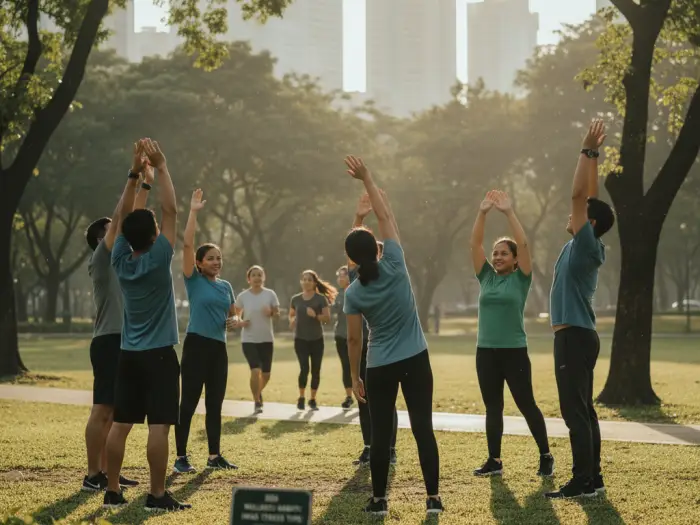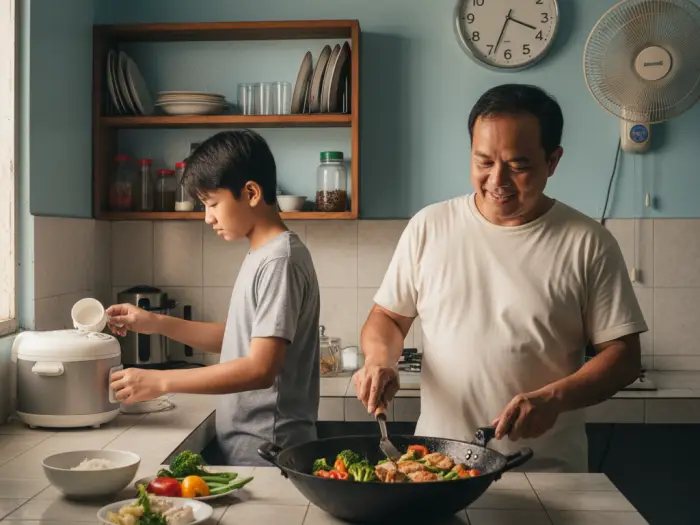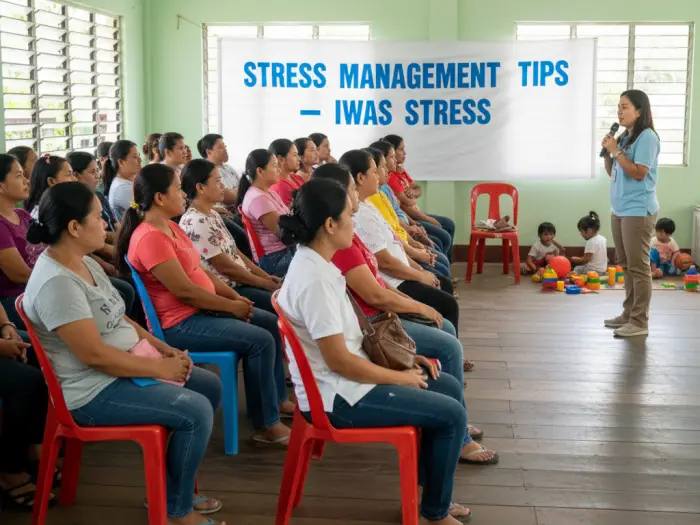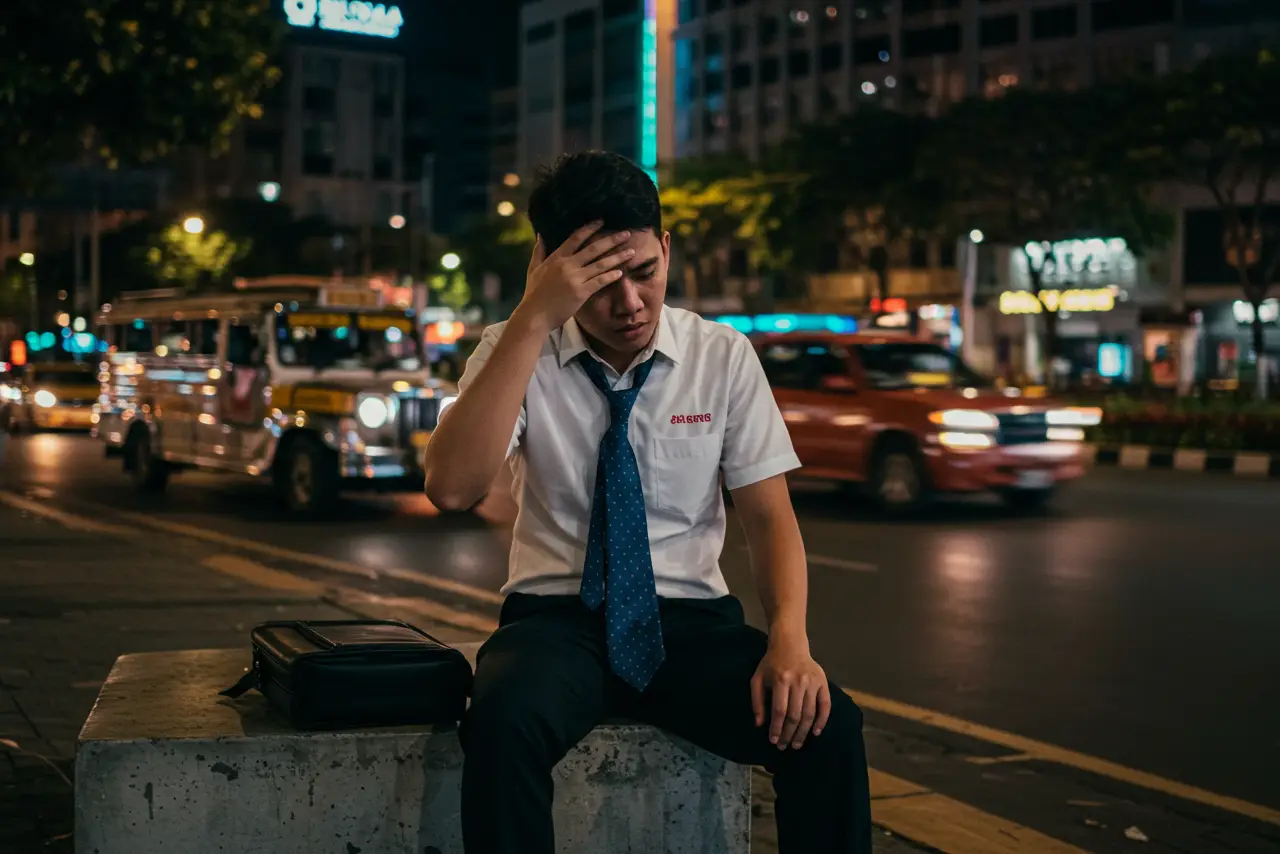If you’ve ever been stuck for two hours on EDSA, stretched your sweldo hanggang next cutoff, or juggled work deadlines with family obligations, you know stress is already part of daily Pinoy life. In fact, studies show that 87% of Filipinos experience work-related stress-much higher than the global average.
But here’s the good news: while stress may feel unavoidable, burnout isn’t. With the right stress management tips, you can protect your mental health, recharge your energy, and even find joy in the middle of everyday struggles.
This article is your practical guide to iwas stress-a mix of medical insights, DOH-recommended habits, and Filipino-style coping techniques (from siesta breaks to kwentuhan with friends). Whether you’re a student, an OFW, or an employee trying to balance trabaho and pamilya, these stress-busting habits are for you.

💡 Why Stress is a Big Deal in the Philippines
Stress isn’t just “pagod lang” or something you can brush off. Chronic stress can quietly take a toll on both physical health and family life. In the Philippines, where many of us already juggle demanding jobs, financial challenges, and long commutes, the effects can be more serious than we think.
Health experts warn that prolonged stress can lead to high blood pressure, diabetes, heart problems, and even a weaker immune system. For Filipinos, who often delay check-ups dahil mahal ang hospital bills, stress becomes a silent enemy that worsens existing conditions.
It also creeps into family life. Irritability from a bad commute, burnout from work deadlines, or sleepless nights from money worries can spill over into relationships. Maraming Pinoy households ang nag-aaway not because they don’t love each other, but because stress keeps piling up without healthy release.
What’s more alarming: studies show that the Philippines often ranks among the most stressed nations globally. A survey by Gallup revealed that nearly 48% of Filipinos experience daily stress-the highest rate in Southeast Asia. That means halos kalahati ng kababayan natin feel stressed every single day.
When left unchecked, stress doesn’t just make life harder-it puts our health, happiness, and future at risk. That’s why stress management isn’t a luxury-it’s a necessity for every Pinoy.
📊 Quick Facts: Stress and Health in the Philippines
| Stress Impact | How It Shows in Pinoy Life | Long-Term Risk |
|---|---|---|
| High Blood Pressure | Lagi kang galit sa traffic, mabilis mapikon | Heart attack, stroke |
| Poor Sleep | Hirap makatulog dahil sa bills o utang | Weak immune system, fatigue |
| Family Strain | Irritability at short temper sa bahay | Broken relationships |
| Work Burnout | Overwork, no time for hobbies/family | Depression, anxiety |

🚦 Common Causes of Pinoy Stress
For many Filipinos, stress isn’t some abstract medical term-it’s something we face araw-araw. Whether it’s the long wait for a jeepney, juggling multiple raket just to cover bills, or worrying about loved ones abroad, stress has become part of our national story.
🚌 Traffic and Long Commutes
Metro Manila consistently ranks as one of the world’s worst cities for traffic. Imagine spending two to three hours a day just to get to work and back. That’s time you could’ve spent with your family, sleeping, or doing something for yourself. Instead, you’re stuck on EDSA, inhaling usok and feeling pagod before the day even begins.
💼 Overtime Work and Job Pressures
The Filipino work ethic is admirable, but it often comes at a cost. Long hours, unrealistic deadlines, and the pressure to always say “yes” to the boss take a toll. Many Pinoys fear losing their jobs if they speak up, kaya kahit sobra na ang workload, tinitiis. Over time, this leads to burnout and even health problems.
👨👩👧👦 Pamilya Obligations
Family is everything to us-but let’s be real, it can also be a source of stress. From providing for extended relatives, paying school tuition, to caring for elderly parents, the responsibilities never seem to end. And because we value utang na loob so deeply, we often push ourselves beyond our limits, kahit wala nang natitira for self-care.
🌍 OFW Worries
For OFWs, stress comes in a different form-homesickness, cultural adjustments, and pressure to send remittances back home. For families left in the Philippines, waiting for a loved one abroad also brings emotional strain. Both sides silently carry the weight of separation.
📱 Social Media Noise
Social media can connect us, but it also adds to stress. Doomscrolling through negative news, seeing curated “perfect” lives of others, or online conflicts can all trigger anxiety. Some studies even link heavy social media use to increased feelings of depression and loneliness.
No wonder surveys show that 48% of Filipinos report feeling daily stress-the highest in Southeast Asia. Whether you’re in Manila traffic, working abroad, or scrolling endlessly on Facebook at midnight, the struggle is real.

🌸 Everyday Stress-Busting Habits (Ang 12S ng DOH)
The Department of Health (DOH) has long promoted the “12S for Stress Management”-simple, everyday habits that help Filipinos stay calm, healthy, and happy. Here’s the list in a friendly, Pinoy-style breakdown:
| DOH “12S” Habit | Simple Pinoy Explanation | Real-Life Example |
|---|---|---|
| 1. Siesta | Short rest or power nap | 20-minute break after lunch before going back to trabaho |
| 2. Sports | Keep active, kahit simple exercise lang | Morning jog sa barangay or playing basketball with barkada |
| 3. Stretching | Relieve tension with simple movements | Stand up from desk and do arm/neck stretches every hour |
| 4. Sounds | Listen to relaxing or feel-good music | Playlist ng OPM love songs or worship music habang traffic |
| 5. Smile | Practice positivity, kahit simpleng ngiti | Smiling at coworkers kahit stressful ang shift |
| 6. Sleep | Prioritize 7–8 hours of quality rest | Switching off social media by 10pm to get proper tulog |
| 7. Strengthen Family Ties | Bond with loved ones for emotional support | Family dinner or kwentuhan over merienda |
| 8. Stress Debriefing | Share your feelings, don’t bottle it up | Venting to a trusted friend after a rough day |
| 9. Spirituality | Pray, meditate, or practice faith | Attending mass, prayer before work, or meditation |
| 10. Sense of Humor | Laugh more, don’t take everything too seriously | Watching Vice Ganda skits or family karaoke night |
| 11. Socialization | Stay connected with friends and community | Meeting barkada for coffee or volunteering at church |
| 12. Stress Management Proper | Use proven relaxation techniques | Deep breathing, hilot massage, or guided meditation |
🛶 Turning the 12S into Everyday Life
These “12S” habits aren’t abstract-they’re things we can actually do, kahit gaano ka-busy. Here’s how they look in real Pinoy life:
-
Siesta & Sleep – Instead of scrolling endlessly sa TikTok, try resting even for 20 minutes. That quick nap can recharge your brain for the afternoon grind.
-
Sports & Stretching – No need for expensive gym memberships. A quick jog sa barangay, Zumba sa covered court, or even dancing while cleaning the house counts.
-
Sounds & Smile – Ever notice how an OPM playlist or praise song can instantly lighten the mood? Add a smile, and you’ll see stress levels drop kahit nasa jeep ka pa.
-
Family & Socialization – A simple kwentuhan with your kids, tawanan with barkada, or Sunday lunch with parents can be the best de-stressor.
-
Spirituality & Sense of Humor – Faith and laughter are deeply woven into Pinoy culture. Whether it’s praying for strength or watching “It’s Showtime” to laugh off problems, these give us resilience.
-
Stress Debriefing & Stress Management – Don’t keep it bottled up. Share your struggles with a trusted kaibigan, or try deep breathing techniques when you feel overwhelmed. A hilot session also works wonders for releasing physical tension.
The point is, stress will always be there-but the 12S remind us that small, consistent habits can keep us balanced and strong.

🥗 Healthy Lifestyle Changes to Combat Stress
Sometimes stress comes not just from outside forces like traffic or bills, but also from the way we live. The good news? Small lifestyle changes can have a big impact on our mood, energy, and overall health.
Here’s a quick guide to swapping stressful habits with healthier ones:
| Stressful Habit (Iwas!) | Healthier Swap (Subukan!) | Why It Helps |
|---|---|---|
| Skipping Breakfast (kape lang + yosi) | Nutritious “baon” (oatmeal, fruits, or pandesal with itlog) | Stabilizes energy and avoids irritability |
| Too Much Kape/Softdrinks | Salabat or herbal teas | Calms the nerves and helps digestion |
| Junk Food & Chichirya | Balanced Pinoy Meals (gulay, isda, brown rice) | Fuels body with nutrients, not empty calories |
| Sedentary Life (higa after work) | Daily Lakad or Zumba sa barangay | Releases endorphins, boosts mood |
| Sleeping Late (scrolling TikTok) | Consistent Bedtime Routine (7–8 hours sleep) | Restores energy and lowers stress hormones |
| Bottling Emotions | Talking to a Friend or Journaling | Releases mental load and clears the mind |
🍲 Eat Better, Feel Better
Food is comfort for Pinoys-but too much fried or instant meals add to stress by making us sluggish. Swap chichirya for fruits, or choose fish and gulay instead of fast food. Even simple baon prep can go a long way in boosting energy.
🏃 Move Your Body (Kahit Simpleng Lakad Lang)
Exercise doesn’t need to be hardcore. Kahit 30-minute lakad around the barangay every morning helps. Zumba in the covered court or basketball with the barkada counts as stress relief, too. Movement releases “happy hormones” that fight anxiety.
😴 Prioritize Sleep
Lack of sleep is one of the fastest ways to trigger stress and irritability. Aim for 7–8 hours of quality sleep by setting a bedtime routine: turn off screens, dim the lights, and let your body rest. Para kang nagre-reboot ng cellphone-pag well-rested, mas malinaw ang isip.
😂 Laughter and “Karamay”
Never underestimate the power of laughter. Watching comedy skits, cracking jokes with co-workers, or bonding over videoke night lightens even the heaviest problems. And remember: stress feels lighter when may karamay ka. Share your struggles with a friend, family member, or support group-you’ll feel less alone.

⏰ Building a Stress-Resilient Routine
Stress will always be part of life-traffic won’t magically disappear, bills will keep coming, and work deadlines won’t stop. But what we can control is how we respond to stress. The secret is having a daily routine designed to strengthen resilience. Think of it as your personal “shield” against burnout.
🌅 Morning: Win the Day Before It Starts
Many Pinoys start the day already rushed-late gumising, skipping breakfast, then panicking about traffic. This chaos sets the tone for more stress. But a calm and intentional morning routine can change everything.
-
Wake Up 15–30 Minutes Earlier – Extra time means less habol and less panic. Even 15 minutes can make a huge difference.
-
Prayer or Meditation (5–10 mins) – Filipinos are naturally spiritual. Begin your day with gratitude, rosary prayer, or quiet reflection. It centers your mind.
-
Move Your Body – Do stretches, a brisk lakad around the block, or a short Zumba routine. Exercise not only wakes up your body, it also lowers cortisol (stress hormone).
-
Nutritious Breakfast – Instead of just kape at yosi, fuel your body with a healthy “baon-friendly” meal-oatmeal, fruits, or pandesal with itlog.
-
Set Your Top 3 Priorities – Write them down. This gives you focus so you don’t drown in sabay-sabay na tasks.
💡 Pro Tip: For students, this could mean preparing your bag the night before. For OFWs, it’s sending a quick “good morning” message to family back home-instant mood booster.
🕑 Midday & Afternoon: Protect Your Energy
After lunch, many of us hit that “antok at pagod” slump. This is when stress piles up-work deadlines, client calls, or school requirements. Instead of pushing yourself until you’re drained, try small “recharge rituals.”
-
Siesta or Micro-Nap (10–20 mins) – Scientifically proven to improve focus and mood. No need for a full tulog-just a short rest.
-
Stretch & Hydrate Every Hour – Stand up, do neck rolls, or walk to refill your water bottle. Parang hitting the reset button.
-
Snack Smart – Replace chips with fruits, mani, or boiled corn. Sugary snacks spike your energy then crash it-leading to more stress.
-
Mood Break – Listen to your OPM playlist, step outside for fresh air, or chat with a coworker. Even short “happy breaks” lower tension.
💡 Pro Tip: If you’re an OFW working long shifts, make it a habit to step away from your station for a few minutes. For homemakers, taking a break after chores with a cup of salabat or light music counts as stress relief.
🌇 Evening: De-Stress and Reconnect
This is the most important part of the day. Unfortunately, many Pinoys come home too drained to enjoy it. But evenings are the best time to recharge emotionally.
-
Family Connection – Share kwento over dinner, ask your kids about school, or watch a teleserye together. Strengthening ties is proven to buffer stress.
-
Pursue a Hobby – Whether it’s gardening, playing guitar, online gaming, or cooking a new dish-do something that gives ikigai (joy).
-
Limit Overtime When Possible – Productivity doesn’t always mean working late. Learn to set healthy boundaries.
-
Digital Detox – Avoid doomscrolling or engaging in online drama at night. Social media is one of the fastest triggers of stress.
💡 Pro Tip: If you live away from family (like OFWs or students in Manila), schedule a quick video call. Even 10 minutes of laughter or “kamusta” time works wonders.
🌙 Night: Rest, Reset, Recharge
Stress piles up when the body doesn’t get enough sleep. And yet, Pinoys often sacrifice sleep-binge-watching K-dramas, playing ML, or endless TikTok scrolling. The fix? Create a night ritual that signals your brain it’s time to rest.
-
Bedtime Ritual – Take a warm bath, sip chamomile tea, or do breathing exercises. Consistency trains your body to wind down.
-
No Gadgets Rule (1 hour before sleep) – Blue light from screens tricks your brain into staying awake. Replace scrolling with reading or journaling.
-
7–8 Hours of Sleep – This is non-negotiable. Sleep repairs the body, resets hormones, and restores mental clarity.
💡 Pro Tip: For parents, try “quiet time” with your kids-reading bedtime stories not only calms them but also relaxes you. For single Pinoys, journaling your thoughts before bed helps release stress and promotes deeper sleep.
🔑 Why a Routine Matters
By turning healthy habits into part of your routine, you no longer need to decide every day. Your body and mind automatically shift into “stress defense mode.” Over time, you’ll notice:
-
Less irritability kahit nasa traffic.
-
Better focus and productivity at work/school.
-
Stronger relationships dahil di ka laging drained.
-
Improved health-lower BP, better sleep, more energy.
👉 With a stress-resilient routine, you don’t just survive-you thrive. The goal is not to eliminate stress completely (impossible, diba?), but to strengthen your capacity to handle it without burning out.

❓ FAQs on Stress Management for Pinoys
Q1: Normal ba ang ma-stress at kailan dapat mag-seek ng help?
Yes, normal ang ma-stress lalo na with daily challenges. Pero kung sobra na-like hindi ka na nakakatulog, anxious araw-araw, or di ka na makafunction-it’s time to seek professional help from a counselor or doctor.
Q2: Ano ang puwedeng gawin kung stressed sa work araw-araw?
Take short breaks, practice deep breathing, at iwas dalhin ang work sa bahay. Talk to your boss about workload if possible, and recharge with relaxing activities after work like hobbies or family bonding.
Q3: May herbal or natural remedies ba to relieve stress?
Yes, some Pinoys find relief in teas like chamomile or salabat, and essential oils like lavender. Just make sure they’re DOH-approved and remember these complement, not replace, healthy habits.
Q4: Paano ko maiiwasan ang burnout kung laging overtime sa trabaho?
Set boundaries when you can, prioritize important tasks, and learn to say no if sobra na. Simple time management and rest days are essential para di ka ma-drain.
Q5: Nakakatulong ba ang exercise kahit simpleng lakad lang?
Yes, even 30 minutes of walking a day can release endorphins and lower stress. Hindi kailangan ng gym-barangay jogs, Zumba, or basketball with barkada are enough.
Q6: Puwede bang gamitin ang social media to de-stress?
Pwede, like watching funny reels or connecting with friends. But be mindful-too much scrolling or exposure to negative news can increase stress instead of helping.
Q7: Ano ang mabilis na stress relief techniques kapag nasa biyahe o traffic?
Deep breathing, listening to calming OPM playlists, or even short mindfulness prayers help. Instead of focusing on the traffic, use the time to relax your mind.
Q8: Paano makakatulong ang family bonding sa stress?
Strong family ties give emotional support and comfort. Simple kwentuhan over merienda or laughter during dinner can lighten heavy problems.
Q9: Paano nakakaapekto ang diet sa stress levels?
Sugary and oily foods can cause energy crashes, making stress worse. Balanced meals with gulay, isda, and fruits help keep your body and mind steady.
Q10: Ano ang unang hakbang para maging stress-resilient?
Start small-pick one habit like sleeping earlier or taking a short siesta. Consistency builds resilience, and little by little, you’ll notice life feels lighter and more manageable.

🌟 Choose Wellness, Choose Yourself
Stress will always be part of life-lalo na dito sa Pilipinas, where we juggle heavy traffic, sweldo-to-sweldo budgets, family obligations, and countless daily pressures. But here’s the truth: stress doesn’t have to control you.
By making small, intentional choices-whether it’s taking a quick siesta, sharing kwento with loved ones, or learning to pause and breathe-you’re already building a stronger, healthier version of yourself. These habits may look simple, but they form the backbone of resilience. Imagine a future where instead of collapsing from burnout, you’re able to face challenges with a clear mind, a lighter heart, and more energy for the people who matter most.
Remember this: caring for yourself is not selfish-it’s a form of love. A calmer, happier you is the best gift you can give your pamilya, barkada, and even your workplace. Stress may knock at your door every day, but you get to decide whether it stays inside your home or not.
So the next time life feels overwhelming, remind yourself: “Kaya ko ‘to.” With prayer, laughter, support, and healthy routines, you can rise above stress and live the kind of life you truly deserve. 🌸










